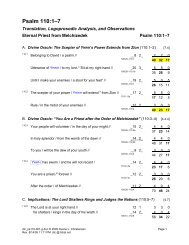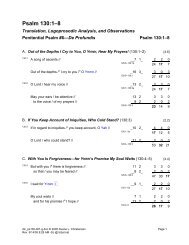Reading Genesis 1-2 in Hebrew - Bibal.Net
Reading Genesis 1-2 in Hebrew - Bibal.Net
Reading Genesis 1-2 in Hebrew - Bibal.Net
Create successful ePaper yourself
Turn your PDF publications into a flip-book with our unique Google optimized e-Paper software.
<strong>Read<strong>in</strong>g</strong> <strong>Genesis</strong> 1–2 <strong>in</strong> <strong>Hebrew</strong><br />
hA-'A-dAµm neµ-peH xay-y‰µ h˚µ' H¸-mÙµ, “and whatever the human called it, as a liv<strong>in</strong>g be<strong>in</strong>g, that<br />
(was) its name.” The noun lk (“all”) <strong>in</strong>troduces a relative sentence with reH‹' (particle of<br />
relation). The comb<strong>in</strong>ation of these two words means “whatever.” The verb here is Qal imperfect<br />
3 rd sg. masc. from the root 'rq (“call”) followed by the preposition l, with the 3 rd sg. masc. suffix<br />
Ù (“it, him”) attached. The l functions as a marker for the direct object. The noun phrase<br />
hCƒyax Hepen (“a liv<strong>in</strong>g be<strong>in</strong>g”) is <strong>in</strong> apposition to the pronoun '˚h (“he”), which carries the force of<br />
the demonstrative pronoun “that” with the verb “to be” understood. The noun £EH (“name”) has<br />
the 3 rd sg. masc. prom<strong>in</strong>al suffix Ùñ (“its, his”) affixed, which causes the vowel to be reduced to<br />
Õñ. Before the fem. plural affix tÙñ, however, the Eñ is reta<strong>in</strong>ed.<br />
�������������������������œ•���2:20�<br />
������������������������������‘���������<br />
���������ƒ����„ ����û����‘�������������������������•œ�����„��������<br />
������������������������œ•��—transliteration:<br />
way-yiq-rAµ' hA-'A-dAµm HE-mÙµt, “and the human called out<br />
names …” The verb here is Qal imperfect 3 rd sg. masc. with wau-conversive from the root 'rq<br />
(“call”) with £AdA'Ah (“the human”) as subject. tÙmEH is the plural of the masc. noun £EH (“name”).<br />
The accent r¸bÓav on the word ������ is a relatively strong disjunctive.<br />
�����������������������������‘�����—transliteration:<br />
l¸-kol-haB-B¸-hE-m‰µ ˚-l¸-vÙµp haH-HA-maµ-yim, “for<br />
every animal and for every bird of the sky.” In some ways, the two occurrences of l here mark<br />
the direct object of the verb “call” at the beg<strong>in</strong>n<strong>in</strong>g of this verse. The vowel of the word lOk (“all,<br />
every”) is shortened to qAmAc xAX˚p (o) before maqqEp. The noun hAmEh–¯b here refers to all<br />
animals. The wau-conjunction before shewa becomes ˚. On the phrase £ymHh •Ùv (“birds of the<br />
sky”) see 1:21.<br />
�����������•œ�����<br />
See 1:19.<br />
„����—transliteration: ˚-l¸-kOµl xay-yaµt haH-HA-deµh, “and for every animal of the field.”<br />
���������ƒ����„ ����û����‘��������������<br />
— transliteration: ˚-l¸-'A-dAµm lO'-mA-cAµ' vEµ-zer K¸-neg-DÙµ, “and for<br />
Adam there was not found a helper fit for him.” The noun £AdA' (“human”) appears here without<br />
the def<strong>in</strong>ite article, which suggests that it is used as a proper name here. The verb is Qal perfect<br />
3 rd sg. masc. with the particle of negation prefixed from the root 'cm (“f<strong>in</strong>d”). On the phrase<br />
Ùdg∆n–¯k rezEn (“a helper fit for him”) see 2:18.<br />
������œ•���„<br />
�������‘�����ô�������������‡<br />
������������������π•œ•���2:21�<br />
��������������„ ��������û����œ•����������������������������œ•�����<br />
© 2005 BIBAL Corporation, All Rights Reserved Version 1.0<br />
34





